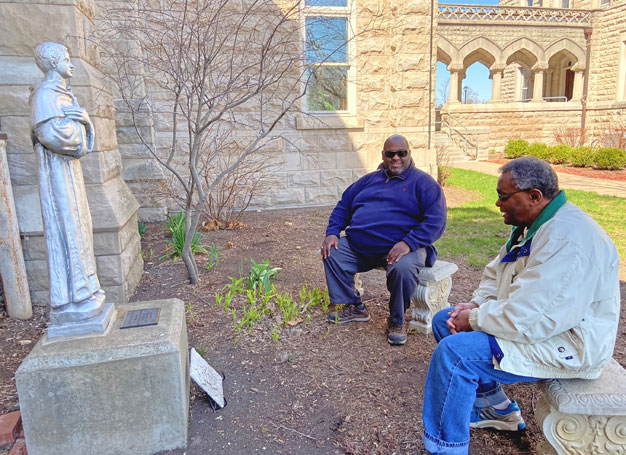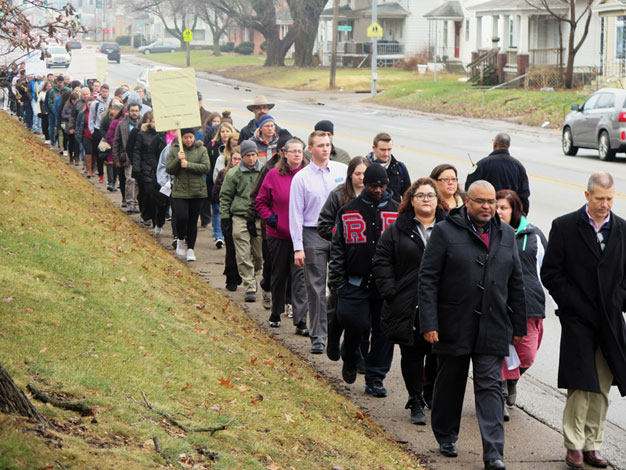By Barb Arland-Fye and Lindsay Steele
The Catholic Messenger
The guilty verdict in the Derek Chauvin trial shows “that our judicial system works through we the people,” says Jim Collins, a parishioner at Sacred Heart Cathedral in Davenport. He echoes the words of Bishop Thomas Zinkula who said in a statement following the verdict … “the hard work of achieving racial reconciliation and justice must continue with prayer, learning and action.”
On April 20, a diverse jury found Chauvin, a white, former Minneapolis police officer, guilty of second-degree unintentional murder, third-degree murder and second-degree manslaughter in the May 25, 2020, death of George Floyd, a Black man. Video recorded by 17-year-old bystander Darnella Frazier and seen round the world showed Chauvin with his knee pressed on the neck of Floyd for more than 9 minutes as he lay on the ground, handcuffed and pleading for his life.
Going forward, “Our actions ought to include rooting out racism in our homes, schools, workplaces, institutions and the public square, as well as advocating for state and federal laws that recognize and reinforce the dignity of every person,” Bishop Zinkula said. “Through our prayer, learning and action, we reaffirm that every single person is made in the image and likeness of God and hence has intrinsic dignity.”
Black Catholics share their perspective
“Become more informed on the many different perspectives of the issue of race and its history in America (the good, the bad and the ugly),” said Collins. “Don’t expect to find ‘instant gratification’ for what you think is right, and don’t advocate change just for the sake of change as you may end up ‘throwing out the baby with the bath water.’”
After becoming informed, he encourages people of faith to work, “giving of your prayers, time, talents and treasures to sustain and build on the positives that so many others before you have already sacrificed (including life) for.”
For Christians, “there is no right way to do a wrong thing,” Collins said. For example, Martin Luther King, Jr. “never threw a brick or burned a building in protesting for and advancing the cause of racial justice and equity. Can we all agree that MLK changed the foundation of the world as to how we look at it from a racial and equity perspective?”
Thomas Mason IV, who leads the St. Martin de Porres Society at Sacred Heart Cathedral, said the Chauvin verdict was the “first time in the state of Minnesota that a police officer has been convicted of murdering an unarmed Black man.”
“Like most Americans,” said Mason, “I find relief in the fact that this former police officer is being held accountable for his actions. However, I have to question what would have happened if the courageous teenager who had the foresight to record the events as they were transpiring had not done so. Would there have been justice or accountability?”
The verdict in the Chauvin trial “is a call to continue the fight for racial unity, equity and inclusion. Together, through education, love and prayer, we can make this vision a reality.” It requires examining “your own racial experiences, including white privilege and the fact that you may have unearned privilege due to your race or ethnicity while others have unearned disadvantage due to their race or ethnicity. Work to eradicate racism in your respective communities such as the workplace, school, social network, etc.”
Mason believes “Racism is perpetuated by silence and silence is complicity. Being ‘colorblind’ often serves as a pretense to downplay the significance of race, deny the existence of racism, and erase the experience of people of color. Be willing to have the uncomfortable conversations and turn them into teachable moments. The Catholic Church needs to reinforce through Scripture that God created all human beings equally.”
Finally, “we all need to recognize that eradicating racism is in society’s best interest. I truly believe that when the most marginalized and disadvantaged individuals in society are treated as equals we will have achieved a racially just and equitable society.”
A son of Mason, 18-year-old Chase, says the Chauvin verdict gave him “a sense of hope because (Chauvin’s conviction) is one of the first times that I have seen justice in a police brutality case. I believe this could be a huge step in holding other police officers accountable for their actions.”
Chase Mason asks people of faith to “try to look at our society through a minority’s perspective and understand the problems that they face. This would provide our community with a sense of empathy and determination in order to make it an overall better place.”
“This was a long awaited start with Chauvin,” said Tyla Sherwin-Cole, who previously served as the Diocese of Davenport’s archivist. “The whole system should be next. What can we do? Continue to push for reforms that promote training to officers’ accountability, biases, and de-escalation. Use your voice in all elections. Register to vote. Continue to #sayshisname.”
“Learn about other people and their culture; speak out against biased language; think before you speak.”
White allies offer their suggestions
Trevor Pullinger, pastoral associate at All Saints Parish in Keokuk and parish life coordinator at St. Joseph Parish in Montrose, said that all people sin, and cannot be free from sin until they identify it as such. “We need to hold people in authoritative positions accountable, myself included. Just in the same way the church has done with sexual abuse, we are improving at accountability, yet the work continues.”
Pullinger said accountability is a process in dealing with the sin of racism. He is grateful that Chauvin is being held accountable for his role in George Floyd’s death, but “the work isn’t done, not by a long shot. It has barely even begun. …How can we be liberated from sin if we turn a blind eye to sin, especially in our own personal lives?”
Jeanette Roush-Krafka and Elsabeth Hepworth, adult daughters of diocesan priest Father Bill Roush, wrote in an e-mail to The Catholic Messenger that Chauvin’s conviction signals accountability and a step toward justice, “but we would not call it justice outright. Justice would be a system where every person is treated with dignity and respect, where every person experiences equal rights, equity, equality, inclusion and belonging.”
“For generations, Black and brown neighborhoods have experienced the consequences of stricter law enforcement. This system perpetuates violence, often resulting in the killing of innocent people. We cannot call a system that perpetuates such violence justice. Millions of us saw the video detailing the last few minutes of George Floyd’s life, yet we collectively held our breath, because we weren’t sure the systems in place would convict for the murder we saw with our own eyes. This points to a justice system that is far from just.”
They believe the verdict is only as significant as Americans choose to make it. “Being ‘anti-racist’ and being Christian are practically synonymous in that they are both lifelong endeavors through which we grow to be better, more empathetic, just people. As Christians and as anti-racists we are called to critical self-reflection. We must call to mind the prejudices and biases we hold in our hearts and choose to deconstruct them,” the sisters said. Then, “we can grow together and become better, more empathetic, more compassionate people as we work to build an equal, equitable, inclusive society that incorporates justice for us all throughout all walks of life and within every system we take part in.”









